Smart agriculture is a new model for the development of modern agriculture. Through the application of advanced scientific and technological means and innovative ways of thinking, agricultural production is intelligent, automated and standardized. Smart agriculture combines the Internet of Things, big data, cloud computing, artificial intelligence and other technologies with crop planting, livestock breeding, agricultural mechanization and other aspects to provide more efficient, energy-saving and environmentally friendly solutions for agriculture.

Smart agriculture has a wide range of applications, including crop planting, breeding management, harvesting of agricultural products, and the intelligentization of agricultural machinery. Through sensors, monitoring equipment and Internet of Things technology, smart agriculture can monitor soil moisture, temperature, light and other environmental indicators in real time, thereby regulating irrigation, fertilization, pest control and other tasks, and improving the growth quality and yield of crops. At the same time, smart agriculture can also monitor and control the temperature, humidity, gas concentration, etc. of the breeding farm, provide a scientific and accurate breeding environment, and improve breeding efficiency and output quality.
The core of smart agriculture is data analysis and application. By analyzing a large amount of agricultural data, crop growth conditions can be predicted and optimized, including suitable climate, soil, moisture and other environmental factors. Based on the results of data analysis, smart agriculture can also provide decision-making support for agricultural experts and farmers, use data models to formulate planting and breeding strategies for them, and improve resource utilization efficiency and economic benefits. Smart agriculture can also realize the traceability of the agricultural supply chain and ensure the quality and safety of agricultural products through big data and artificial intelligence technology.
The application of smart agriculture can not only improve the quality and yield of agricultural products, but also reduce resource waste and environmental pollution. Through advanced data analysis and agricultural management, unnecessary fertilization and pesticide use can be avoided, and pollution to soil and water quality can be reduced. Smart agriculture can also save energy and reduce greenhouse gas emissions, achieve sustainable use of energy, and contribute to environmental protection. Smart agriculture is an important part of sustainable agricultural development and provides broad space for future agriculture.

As a technological pioneer leading the agricultural revolution, smart agriculture has changed the traditional agricultural production model and closely integrated modern technology with agricultural production. It not only improves the efficiency and quality of agricultural production, but also provides sustainable development solutions for agriculture. In the future, smart agriculture will continue to develop and grow, bringing more opportunities and challenges to global agricultural development.